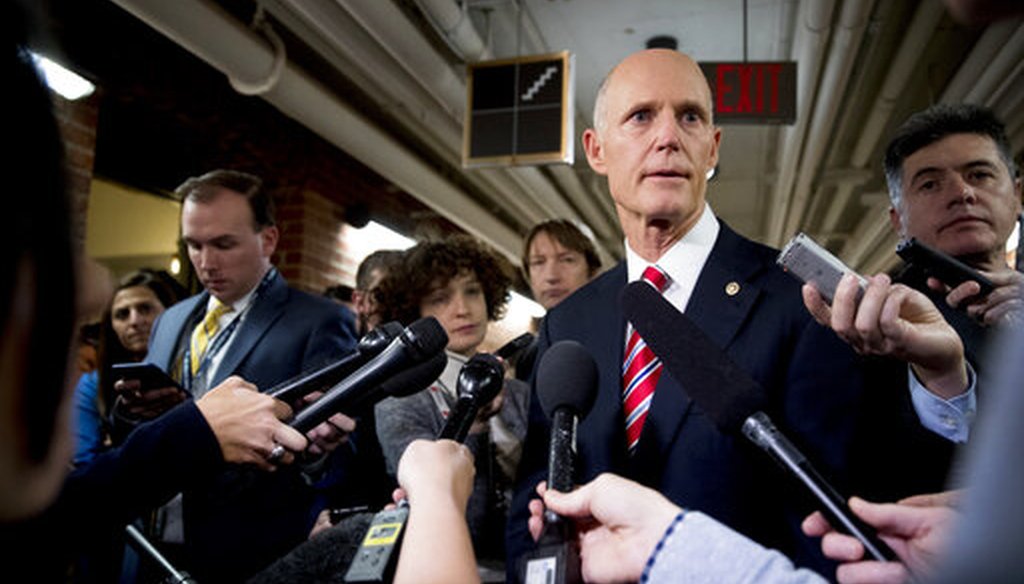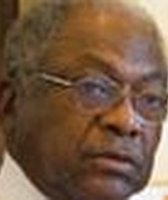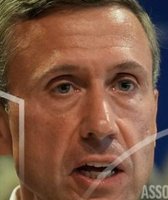Stand up for the facts!
Our only agenda is to publish the truth so you can be an informed participant in democracy.
We need your help.
I would like to contribute

Sen. Rick Scott, R-Fla., speaks to reporters outside his office on Capitol Hill in Washington, Wednesday, Jan. 23, 2019. Scott took questions on Venezuela and the government shutdown. (AP)
The contest over who will be the next president of Venezuela has drawn in the United States.
In May, President Nicolás Maduro won re-election in a race that was criticized as rigged. Maduro was sworn in Jan. 10 despite criticism from opposition leaders and the international community that his presidency was illegitimate.
National Assembly President Juan Guaidó organized an opposition march that drew thousands and declared himself the interim president. He was sworn in Jan. 23.
The day before, Florida’s top Republicans, including U.S. Sen. Rick Scott, met with President Donald Trump to urge him to recognize Guaidó as the interim president. Trump agreed.
After the meeting, Scott blamed socialism for Venezuela’s downfall, adding in a jab at American Democratic leaders:
"If you want to look at how socialism works, look at Venezuela. What Chávez started, what Maduro has continued, there's no food, there's no gas, there's no medicine. That's socialism, and we've got a lot of Democrats up here that are promoting socialism. I think what they ought to do first is do a fact-finding trip. Rather than going to Brussels, maybe they'll go to Caracas and see how socialism really works."
The next day, Scott again urged research, suggesting on Twitter that Sens. Bernie Sanders and Elizabeth Warren "take a fact-finding trip to visit your buddy #Maduro in Caracas and report back on the real impacts of socialism."
We love fact-finding at PolitiFact, so we took up Scott’s challenge. Is socialism to blame for the crisis in Venezuela?
We asked Scott’s spokesman for evidence, but he didn’t provide any. "If you guys really want to defend the virtues of socialism, that’s your prerogative," Scott spokesman Chris Hartline said.
We are not defending socialism, for the record. For this story, we wanted to talk to experts on the country about Scott’s take. (Because of the complexity of the situation in Venezuela, we won’t issue a rating.)
State control of industry did have a role in Venezuela’s collapse, they told us. But just as important were other factors: corruption, mismanagement and authoritarian leaders who weren’t held accountable for their abuses of power.
Defining socialism
Socialism historically revolved around the public ownership or coercive redistribution of industries and resources, said George Washington University political scientist Samuel Goldman. But it has evolved to generally refer to the wider provision of social services, such as health care or education.
European countries largely abandoned state ownership decades ago. "What’s left is a comparatively generous welfare state, which is what Americans often have in mind when they talk about socialism today," Goldman said.
Comparisons of Venezuela to a democratic socialist country such as Norway are not useful. Norway has a long tradition of democracy, political parties and accountability. It is a wealthy country with a diversified economy, a high quality of life and strong worker protections. Venezuela has almost none of those things.
When Sen. Bernie Sanders, I-Vt., uses the democratic socialist term, he is referring to expanding U.S. social programs already available, along with potentially higher tax rates to pay for them. Scott’s tweet also mentioned Warren, but she has distanced herself from a socialist label, saying "I believe in markets."
Venezuela’s economic collapse
Understanding Venezuela’s fall requires looking at the leadership of former president Hugo Chávez and his 2013 successor Nicolás Maduro. Their policies contributed to inflation, human rights abuses and starvation. More than 3 million people have left Venezuela in recent years. Many of them who came to the United States are in Florida.
Venezuela’s most critical problem is a near total dependence on oil, said Pomona College Latin American history professor Miguel Tinker Salas, the author of books on Venezuela.
"The dependence on the oil industry is the structural problem, to which you add the lack of investment in the industry, the infrastructure, mismanagement, incompetence, a reliance on heavy crude which costs more to refine, good old-fashioned corruption, economic improvisation, and then add U.S. sanctions, which make it impossible to borrow or renegotiate loans, and you have the makings of a crisis," he said.
Chávez became president in 1999. Six years later, he announced he would transform Venezuela’s economy with "21st Century Socialism."
Chávez nationalized several industries and made major changes in the oil industry. His policies created major problems for the oil industry, wrote Francisco J. Monaldi, a fellow in Latin American Energy at the Baker Institute for Public Policy at Rice University, in a 2018 paper.
Amid a strike in 2002-2003, he fired about half of the workforce of the Petróleos de Venezuela, S.A., the state-owned oil and natural gas company, and later forcefully renegotiated joint ventures and operating contracts with foreign companies and partially nationalized these projects. ExxonMobil and ConocoPhillips withdrew from the country, and these policies drove the state-owned oil company into significant debt. Investment in oil development and production declined.
Venezuela spent billions providing subsidized oil to Cuba — a practice that has continued despite the fact that the country doesn’t have enough money to buy food and medicines for its own people.
Chávez’s polices went unchallenged because he took control of the courts and the media, and he punished human rights defenders.
As global oil prices dropped in 2014, Venezuela fell into a recession, and the country’s oil industry collapsed under Maduro, who took power in 2013.
Maduro has run the country as an autocrat. His government has cracked down on protesters and killed demonstrators.
Experts point to corrupt leadership in Venezuela
Many of the experts we interviewed blamed the policies enacted by leaders for causing Venezuela’s problems.
Francisco Toro, author of the Caracas Chronicles website and a Washington Post global opinions columnist, told PolitiFact the problems in Venezuela stem from "corruption, authoritarianism, incompetence and then doctrinaire socialism — the state taking control and not letting people run their businesses. Those things all play a role; in Venezuela they have all four — that is what is unique."
Scott is ignoring that socialists have taken power in several Latin American countries and that it hasn’t led to disaster, Toro said.
"Mysteriously, the supposedly automatic link between socialism and the zombie apocalypse skipped all of them," he wrote in a column. "Not content with merely not-collapsing, a number of these countries have thrived."
Bolivia is an example of a socialist-run country that reduced poverty and saw some economic gains.
"Turns out the difference between Bolivia and Venezuela has nothing to do with abstract ideological labels, and everything to do with fiscal prudence," he wrote.
Dany Bahar, a Venezuelan and Israeli economist at Brookings Institution, said Venezuela is a man-made crisis, which includes mismanagement and excessive control over the private sector.
However, "Scott has a point because there are many policies in place in Venezuela, particularly price control and other suffocating regulations on the private sector that leans toward a socialist rhetoric."
When conservatives in the United States talk about Venezuela, they are using it to delegitimize vast sectors of the left, Toro wrote in the Washington Post.
"After all, if you convince people that every left-wing government is on a slippery slope to Venezuela, the entire left becomes toxic. Which is very much the point. Don't be fooled. All that Venezuela demonstrates is that if you leave implementation to the very worst, most anti-intellectual, callous, authoritarian and criminal people in society, socialism can have genuinely horrendous consequences. But couldn't the same be said of every ideology?"
Our Sources
C-SPAN, Florida Lawmakers on Crisis in Venezuela and Government Shutdown, Jan. 22, 2019
CQ Transcript, "Florida Lawmakers Hold Media Availability Following White House Meeting on Venezuela," Jan. 22, 2019
Gov. Rick Scott, Tweet, Jan. 23, 2019
Washington Post, "As socialist Venezuela collapses, socialist Bolivia thrives. Here’s why," Jan. 5, 2017 (Toro)
Yahoo Finance, "Here's why you can't blame socialism for Venezuela's crisis," May 19, 2018
Asa Cusack op ed Al Jazeera, "Is socialism to blame for Venezuela's never-ending crisis?" May 31, 2018
Francisco Toro op ed in Washington Post, "Venezuela proves nothing about socialism," Aug. 27, 2018
Miami Herald, "For Venezuelan seniors, the 'golden years' mean picking through garbage for food," May 19, 2017
BCC News, Venezuela profile - Timeline, Aug. 29, 2019
Reuters, "Factbox: Venezuela's nationalizations under Chavez," Oct. 7, 2012
Human Rights Watch, "Venezuela: Concentration and Abuse of Power Under Chávez," July 17, 2012
Washington Post Megan McArdle column, "Venezuela’s inflation will hit 1 million percent. Thanks, socialism," July 27, 2019
New York Times, "Chávez Restyles Venezuela With '21st-Century Socialism,'" Oct. 30, 2005
Atlantic Council paper by Francisco Monaldi, "The collapse of the Venezuelan oil industry," 2018
BuzzFeed, "Think Elizabeth Warren And Bernie Sanders Are The Same? She Doesn’t," Aug. 23, 2018
Miami Herald, "Venezuelans are starving, but the country still sends crude to Cuba," July 11, 2019
PolitiFact, "No, Florida's Andrew Gillum does not have a far left socialist platform," Sept. 6, 2018
PolitiFact, "A vote for any Democrat is not a vote for socialism, open borders and tax increases," Oc.t 24, 2018
PolitiFact, Gov. Rick Scott's Pants on Fire statement that Sen. Bill Nelson is a socialist, Sept. 27, 2018
Interview, Chris Hartline, Sen. Rick Scott spokesman, Jan. 24, 2019
Interview, Eduardo A. Gamarra, Florida International University professor of political science in the department of politics and international relations, Jan. 23, 2019
Interview, Jorge Salazar-Carrillo, Florida International University professor of economics, Jan. 24, 2019
Interview, Samuel Goldman, George Washington University political scientist, Jan. 24, 2019
Interview, Francisco Toro, Caracas Chronicles website founder, Chief Content Officer: Group of 50 and Washington Post Global Opinion columnist, Jan. 23, 2019
Interview, Dany Bahar, Brookings Institution fellow, associate at the Harvard Center for International Development, and a research affiliate both at CESifo Group Munich and IZA Institute of Labor Economics, Jan. 24, 2019
Interview, Shannon K. O'Neil, vice president, deputy director of studies, and Nelson and David Rockefeller senior fellow for Latin America Studies at the Council on Foreign Relations, Jan. 24, 2019
Interview, Miguel Tinker Salas, Pomona College Latin American history professor, Jan. 24, 2019












































